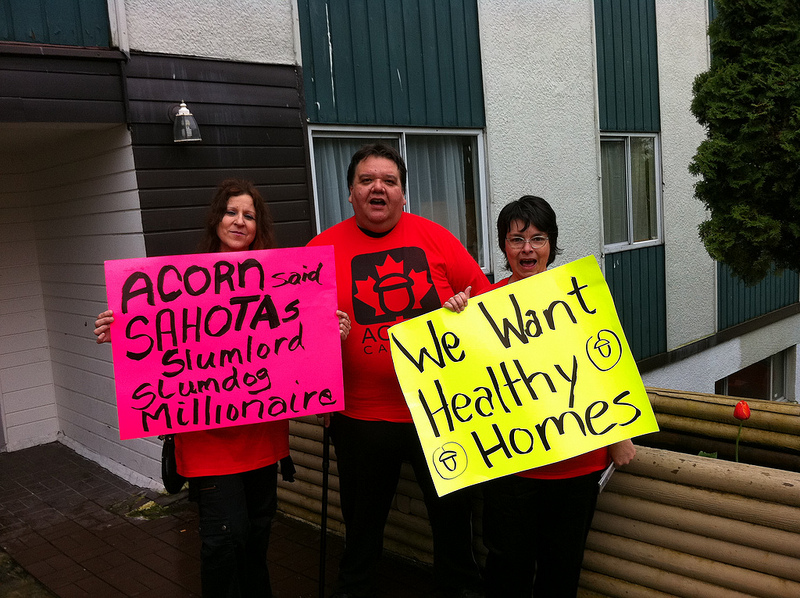Surrey Now: ACORN says Surrey bylaw to penalize bad landlords isn’t perfect, but is a good first step
Posted June 1, 2012
 SURREY – Surrey slumlords will face hefty fines and even jail time if they don’t comply with a bylaw Surrey council passed Monday.
SURREY – Surrey slumlords will face hefty fines and even jail time if they don’t comply with a bylaw Surrey council passed Monday.
Coun. Marvin Hunt supported the bylaw, but said he is unhappy the city has to take such measures.
“This is not our jurisdiction, this is not our responsibility. The only reason we’re doing this is because the Residential Tenancy Act is not doing its job. I think it’s a very regrettable day that we’re having to pass this bylaw.”
The new Standards of Maintenance bylaw includes basic water, heat, light, utility and elevator requirements of landlords. Those who contravene the bylaw provisions are subject to a fine not less than $200, but not exceeding $10,000 for each day an offence persists, and even imprisonment for not more than six months.
“Every week we hear of new cases of tenants lacking basic amenities in their apartments and the new bylaw will give them somewhere to go to get repairs,” said Sue Collard, chair of ACORN Canada’s Whalley/City Centre chapter, an independent organization of low- and moderate-income families. ACORN currently has active tenant unions in nine Surrey buildings that are attempting to work with landlords to fix up their buildings.
 SURREY – Surrey slumlords will face hefty fines and even jail time if they don’t comply with a bylaw Surrey council passed Monday.
SURREY – Surrey slumlords will face hefty fines and even jail time if they don’t comply with a bylaw Surrey council passed Monday.
Coun. Marvin Hunt supported the bylaw, but said he is unhappy the city has to take such measures.
“This is not our jurisdiction, this is not our responsibility. The only reason we’re doing this is because the Residential Tenancy Act is not doing its job. I think it’s a very regrettable day that we’re having to pass this bylaw.”
The new Standards of Maintenance bylaw includes basic water, heat, light, utility and elevator requirements of landlords. Those who contravene the bylaw provisions are subject to a fine not less than $200, but not exceeding $10,000 for each day an offence persists, and even imprisonment for not more than six months.
“Every week we hear of new cases of tenants lacking basic amenities in their apartments and the new bylaw will give them somewhere to go to get repairs,” said Sue Collard, chair of ACORN Canada’s Whalley/City Centre chapter, an independent organization of low- and moderate-income families. ACORN currently has active tenant unions in nine Surrey buildings that are attempting to work with landlords to fix up their buildings.
“In talking with tenants, we hear that some are without heat not for a matter of days, but for a matter of months. That’s significant, especially in the winter months for those who have medical issues,” Collard said, adding that she often hears elevators are not being repaired, which isolates those with mobility issues.
The move from the city comes after Coun. Judy Villeneuve learned of poor dispute resolution through the Residential Tenancy Act (RTA) for tenants with problem landlords.
Villeneuve said tenants often end up having to go through the court system to resolve disputes because the RTA does not enforce its decisions or orders.
Collard noted the same problems with the RTA.
Tenants are often left out of the equation when issues arise, Collard said, as governments shuffle the responsibility around.
“While they argue, someone could die. One of these days, someone is going to die as a result. It’s very serious.”
Collard said the issue for tenants living without the basic necessities is quite significant in Surrey.
According to 2006 census data, renters make up 25 per cent of Surrey households and the median income of renters is $37,090.
“It’s especially significant because Surrey has some of the oldest housing stock in the Lower Mainland, if not the country,” Collard said. Most of Surrey’s purpose-built rental housing was built in the 1960s and 1980s and much of it is in need of repair.
For now, Collard is happy to see the municipal bylaw approved, even though she’d like to see more.
“Tenants who have issues covered by the bylaw are now able to take that up with the city. There will be a faster turnaround if the city enforces the bylaw,” she said, but added that it’s not the toughest bylaw she’s seen.
“It definitely doesn’t compare to Vancouver’s or New Westminster’s [bylaws],” Collard said. “Is it perfect? No. No bylaw is perfect. But it’s a very encouraging first step forward.”
On Monday, council also voted to send a letter to the province requesting funding to undertake the work associated with the bylaw.
Earlier this month, Villeneuve presented a resolution at the Lower Mainland Local Government Association (LMLGA) urging the province to increase the effectiveness and accessibility of dispute resolution for tenants in rental housing. It passed and will now be forwarded to the Union of British Columbia Municipalities for consideration at the annual convention in September.
